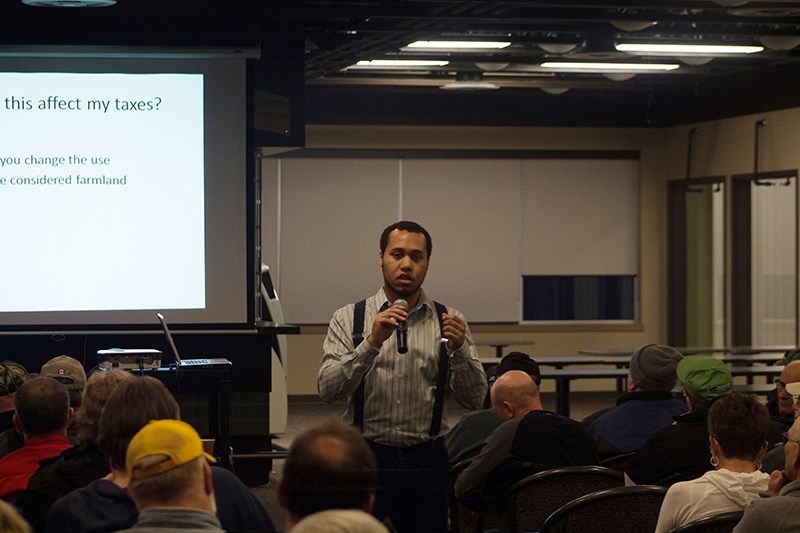Athabasca County residents are wary of proposed changes to the Municipal Development Plan and Land Use By-law that, if approved, will redistrict certain parcels of land within the county.
Jesse Ajayi, Athabasca County director of planning and development, gave a presentation on the county’s rationale behind the proposed updates Feb. 8 at the Athabasca Regional Multiplex.
The proposed changes will redistrict certain sections of the land in the county from agricultural to rural land or vice versa.
Over 100 people attended the session, many who expressed they were not comfortable with how they felt the change could impact them moving forward.
“A big concern for us is that by changing the definition of land from agricultural to rural, you could potentially lose control over what that land is used for,” said Amanda Oldale, who farms 320 acres of land in Ellscott and Paxson with her husband Neil Pedersen.
In his presentation, Ajayi addressed these concerns and several others like them. Although he was interrupted several times during his presentation by attendees who said they were unhappy with the proposed changes, Ajayi said it was a generally good session.
“I think there were a lot of good questions,” said Ajayi, “There were some legitimate concerns, and I’m glad people were taking so seriously the preservation of agricultural land and chose to come out.”
Ajayi said the current districting was determined 14 years ago, and it was not based on the best data, which is also now out of date. The new districting will be done based on newer soil productivity ratings and Canada Land Inventory (CLI) classification.
“The purpose is to match the label that we put on the land with the quality of the soil on the land,” Ajayi said.
Ajayi said the redistricting will provide more protections to prime farmland while giving more flexibility to residents who own land that has been redistricted for rural use. He added the purpose of redistricting is not to prevent people from being able to farm their land.
“There was a concern that if I move to this rural use district I’m not a farmer anymore and I lose privileges or I am no longer considered to have farm land and that is not the case,” Ajayi said.
Ajayi told the attendees that if they do not want their land to be redistricted, they may opt-out of the process by filling out a redistricting exemption request form and submitting it to the county’s planning and development department by Feb. 28. Residents can also opt out by sending an email requesting exemption to the county.
After his presentation, Ajayi, Athabasca County Reeve Doris Splane and several of the county’s other councillors mingled with the crowd to answer questions one-on-one.
In addition to concerns about how redistricting would affect how their land is used, residents voiced other concerns to county officials.
Some were worried that changing land use from agricultural to rural could increase their taxes. Others were worried that changes would allow unwanted development of land that had been redistricted as rural. There were some who simply did not like a change that could potentially limit what they could do with their land.
“It’s about whether or not I have the freedom to do what I want with property I’ve purchased,” said Jim Anderson, a county resident and land owner.
Ajayi responded to these concerns saying that a landowner’s taxes would not change as a result of the redistricting. With regard to issue of land development, he said that while redistricting to rural use would give more options to landowners with regard to how the land is used, development would not automatically proceed unchecked.
“When you loosen restrictions, that means other things are going to be allowed,” he said. “That doesn’t guarantee it, we’ll look at things on a case-by-case basis.”
Splane added that the opt-out clause provided an option for people who did not want to be included in the redistricting.
“I believe our opt-out clause gives a lot of people ability to control their own property,” she said.
Splane said the hearing the community’s concerns was good because the purpose of the session was to engage with the community.
“This is their county and we want to be transparent and have people share their thoughts,” she said. “We want to make the right decisions and information is important to making the right decisions.”
– With files from Hannah Lawson



